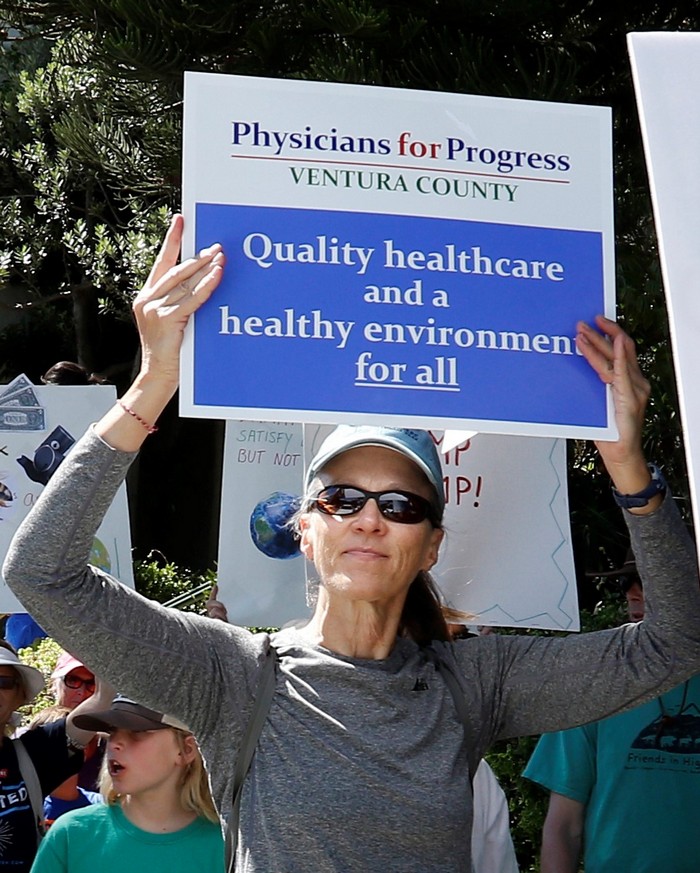Dr. Leslie-Lynn Pawson at the Ventura March for Science.
by Amy Brown
Most people are familiar with the Hippocratic Oath for physicians, which—paraphrased—binds them to treat the sick, preserve confidentiality, and pass on medical knowledge to the doctors coming after them. Physicians for Progress, a group of about 50 doctors in Ventura County, are committed to both the Hippocratic and the democratic. The organization was founded in 2017, focused on solving issues with the current healthcare system, preserving democracy, as well as protecting the environment, which directly affects everyone’s health. They share concerns about the current administration’s attacks on the Affordable Care Act, and are working to influence lawmakers to consider a single payer system, to ensure that all Americans have access to insurance and healthcare. Their endeavors so far have included advocating directly and vigorously with members of congress and state legislators, during town halls and in their offices, holding a Healthcare Forum earlier this year for Ventura residents, and raising awareness through strategic social media outreach.

Dr. Leslie-Lynn Pawson is one of the founding members of Physicians for Progress, a family physician since 1982 who now teaches Family Medicine and Palliative Medicine at VCMC. During her long tenure in the field, she’s had many years to see what works and what doesn’t in the current healthcare system. “Every other wealthy democratic nation on this planet has a variation of single payer healthcare system that provides health insurance to 99 if not 100% of their people. We are absolutely alone as a wealthy democratic country that does not provide health insurance to everybody,” said Pawson. When asked how she and other members of the organization counter some of the typical arguments (concerns about higher costs, for example) against government-engaged healthcare, she shared “Our current system is so much more expensive! We spend 17-18% of our GDP (Gross Domestic Product), while other nations spend 10%, and they get better care for less money. Yes, our taxes will go up, but what each of our individual families will pay in healthcare will actually be less. Access will go up, availability will go up and our health outcomes will go up.”
Many doctors in the organization have seen firsthand what tragedies can happen with the capriciousness of the current health insurance system. Dr. Zadok Sacks is a double board certified internist and pediatrician and has been at VCMC since 2014. He’s seen patients lose their insurance through divorce or loss of employment, and then develop cancers that went untreated, unchecked, and ultimately metastasized. “When you see even one case like that, it’s such a shocking indictment of the way that we fail so many,” said Sacks. “Single payer would keep the same providers in place, with the same range of service, and give folks the safety net of a universally available public insurance system that will pay for all the care they need. Ultimately it is going to drive the cost of healthcare down.”
Some opponents suggest that single payer health care will eliminate competition. “I consider myself very much a capitalist,” said Dr. Clint McBride, who now teaches at the Fort Collins Family Medicine residency program, after his residency at VCMC. “People should be able to work hard and achieve differential levels of economic success. I actually think the correct place for competition in our medical system should be among hospitals and providers—if all patients had the same insurance, then they’d have the freedom to choose the doctors.” According to McBride, often the choice of which medicine a patient is prescribed is based on the type of insurance they have—not what type of medicine would actually benefit them. “I’ve had many, many patients, both in California and Colorado, go without the dose of insulin they need because they can’t afford it. I will often see patients that ration their medicine or take less than they should. They then often progress to needing dialysis or amputations and ultimately they incur even higher healthcare costs.”
McBride has words of encouragement for those who may feel powerless to effect change in something as monolithic and embedded as the current healthcare system. “You have incredible power,” said McBride. “Organize, vote—remember that generations that came before us overcame huge challenges in this country: we abolished slavery, we guaranteed women the right to vote, and we fought world wars against fascists. When you take a historical context and the magnitude of those challenges, certainly guaranteeing the right to healthcare and eradicating medical bankruptcies is a big challenge, but we’ve achieved bigger things before.”

